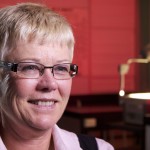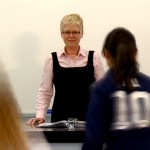Debra Smith
Over thirty years of teaching, Debra Smith has not only inspired thousands of students, she has helped redefine how science is taught in Queensland and across Australia.
She believes that science teaching has to be practical and experimental. She’s brought that approach to her own chemistry classes at Centenary High School in western Brisbane, and also to the development of extended experimental learning in senior teaching in Queensland.
She has the numbers to show that her approach works. Her school’s senior science scores are well above the state average. Thirty-one per cent of students chose senior chemistry in 2008. Similar schools in Queensland achieve less than 20 per cent. And in 2009, 26 of the school’s top 29 students chose science degrees.
For her contribution toward increasing the uptake of science in schools, Debra receives the 2010 Prime Minister’s Prize for Excellence in Science Teaching in Secondary Schools.
Through school Debra was interested in science especially everything hands-on—dissecting things, doing experiments and getting a practical understanding of how things work. That has led her into a life of teaching the next generation of young scientists.
For the last decade she has been head of science at Centenary High School in Jindalee. It’s a young school that opened in 2000 and has grown to 1,100 students. Debra manages a team of 19 teachers involved in science teaching.
She’s seen large changes in the way that science is taught. And she hopes to see more change.
“For me, science is the most important subject in school,” Debra says. “Without our work there would be no scientists, and young people would be much less able to make informed decisions about the impact of science and technology on their lives.”

The trouble with science teaching, she says, is that for too long it was fairly boring, with too much rote learning. She has worked to change that.
“What brings a classroom to life for me is student engagement—the class should be hands-on, with students asking lots of questions, answering lots of questions, telling stories, and talking about what they’ve seen on TV.”
What kind of activities?
- A highlight for Year 8 students is making water bottle rockets—learning about mass, force and kinetics.
- Year 9 students learn about alternative energy. They make their own windmills, investigating which designs produce the most power.
- Year 11’s learn about chemistry by testing the water quality in the Brisbane River. They write up their results and report to Brisbane Council.
And students look at environmental change by monitoring their own campus. When the school was first established, the community was keen for it to be as environmentally friendly as possible. So the school has retained mature trees, and the students maintain nesting boxes around the school which provide opportunities to monitor and track cockatoos, lorikeets, parrots and other birds.
Those students who are particularly interested are invited to join a science club. “We offer them the chance to do more exciting experiments with bubbles, whizzes, bangs and dry ice. Then we get them to go out and give talks and demonstrations at local primary schools for Science Week,” Debra says.
The impact of Debra’s approach to teaching is evident in the school’s performance figures. Not only are more students retaining science subjects in senior school, of the students going on to university, 46 per cent are choosing science.
The last few years have seen substantial changes in Queensland’s science curriculum, reflecting the changes in Centenary’s programs. The imperative from the Queensland government was for students to be engaged in authentic research and to do extended experimental investigations. Debra played a major role in the change—convening the committee that introduced the new approach into chemistry classes across senior schools in Queensland. The changes are now rippling through secondary teaching.
Debra has also played a substantial role in the national statements of learning for science and the current Australian national curriculum. And, she has worked energetically as a mentor and leader for many teacher professional societies including holding the presidency of the Queensland Science Teachers Association, and in her current role of treasurer for the Australian Science Teachers Association.
Much remains to be done. There is a shortage of science teachers to address. “Science teaching is hard work, so teachers might choose a less demanding topic in terms of preparation, marketing, workplace health and safety, student management,” says Debra.
“I think we need to show teachers what a difference we can make with science.”
Technology is making the job easier—teachers have access to much more information than ever before, and there are opportunities to link students with working scientists. But as we introduce these new technologies we need to make sure that science still has a hands-on foundation. “Most students would rather do a real dissection than a virtual dissection,” says Debra.
“The majority of students aren’t going to go on to be scientists, but I think all students need a basic understanding of science and the way it affects them and their world.”
“Job satisfaction comes when the light bulb comes on, when a student says, ‘Oh, you mean…’ and they’re right.”
Qualifications
- Bachelor of Science (Chemistry/Mathematics), University of Queensland, Brisbane
- Diploma of Education, University of Queensland, Brisbane
Career highlights, awards, fellowships and grants
| 2000-present | Head of Science Department, Centenary State High School, Brisbane, Queensland |
| 2008-present | Treasurer, Australian Science Teachers Association |
| 2009-2010 | Writer, Australian Curriculum Assessment and Reporting Authority |
| 2009 | Peter Doherty Award for Excellence in Science Teaching, Queensland |
| 2009 | BHP Billiton Science Teacher Awards Finalist (Queensland winner) |
| 2008 | Life Member, Science Teachers Association of Queensland |
| 2006–2007 | Senior Education Officer, Standards and Assessment Queensland Studies Authority (seconded) |
| 2005-2006 | Writer, Science National Statements of Learning, Curriculum Corporation (seconded) |
| 2002 | RACI Chemistry Education Award, Queensland |
| 1996–1999 | Writer, years 1-10 Science syllabus, and project officer, syllabus implementation, Queensland Schools Curriculum Council and Education Queensland (seconded) |
| 1996-1997 | President, Australian Science Teachers Association |
| 1995, 1999 | Distinguished Service Award, Australian Science Teachers Association |
| 1990 | CRA Science Teaching Fellowship. |
Header image: Debra Smith, winner of the 2010 Prime Minister’s Prize for Excellence in Science Teaching in Secondary Schools (photo credit: Bearcage Productions)

